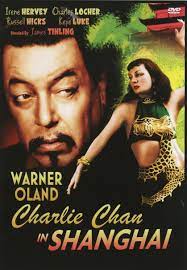
Charlie Chan (Warner Oland) is sent to Shanghai to work with the U.S. government in finding and breaking up an opium smuggling ring. His visit is disguised as a vacation; however, the smugglers are aware of who he is and send him a warning before he even gets off the ship. He is met at the dock by Philip Nash (Jon Hall), the secretary of Sir Stanley Woodland (David Torrence) and Sir Stanley’s niece Diana Woodland (Irene Hervey). Philip tells Charlie that there is going to be a banquet in his honor that night. Also at the dock is Charlie’s son Lee (Keye Luke).
At the banquet Sir Stanley mentions to Charlie that there is an important discovery concerning the smugglers that he needs to discuss with him later. As part of the proceedings Sir Stanley has a jade box containing a scroll to present to Charlie. When he opens the box to read the scroll a booby trap goes off and Sir Stanley is shot. That night someone tries to shoot Charlie.
The next day Charlie receives a note supposedly from the Chief of Police, Colonel Watkins (Halliwell Hobbes) and a driver to bring him to the police station. In reality it is a kidnapping. Lee Chan finds out that the note was faked, and he takes off after the kidnappers only to be kidnapped himself by an accomplice. The two Chans are taken to a house where an unidentified man, Ivan Maloff (Frederik Vogeding) questions them. With some quick talk and fancy footwork by Lee, the two manage to escape the kidnappers.
James Andrews (Russell Hicks), a secret agent from the U.S., arrives to work on the case with Charlie. While they are discussing it another attempt is made on Chan’s life. A fingerprint on the gun reveals an unexpected result. Charlie is at a point where the only one he can trust is his son. Charlie lays an elaborate trap to catch not only the smugglers but the leader of the organization as well.
“Charlie Chan in Shanghai” was released in 1935 and was directed by James Tinling. It is the ninth Charlie Chan film from Fox Film Corporation that featured Warner Oland as Earl Derr Biggers iconic character. There are fifty-three Charlie Chan films, but Biggers only wrote six Charlie Chan novels.
In the film Lee Chan (Keye Luke) is shown with a drawing of himself and his girlfriend. The drawing was actually done by Keye.
The creator of Charlie Chan also wrote the book “Seven Keys to Baldpate” in 1913. The book was turned into a play by George M. Cohen. The play was then made into a film six different times, in 1916 with director Monte Luke, 1917 with director Hugh Ford, 1925 with director Fred C. Newmeyer, all of which were silent, then 1929 with director Reginald Barker, 1935 with directors William Hamilton and Edward Killy and lastly in 1947 with director Lew Landers. The 1925 version is lost.
In the beginning of the movie Charlie is on board the ship with his family. He sings a song for his kids called “The Song of Princess Ming Lo Fu”. It is really Warner Oland’s voice.
“The Song of Princess Ming Lo Fu” Long the journey, hard the way, But his heart was gay; For, was he not a prince both strong and brave, Vowed a princess fair to save?
And he slew the dreadful dragon, Even cut off his seven heads; And in his cave he found the princess Bound to her lowly bed.
Then came they both back to the land Of the mighty Emperor Fu Manchu, To claim his reward, the dainty hand Of lovely Ming Lo Fu.

